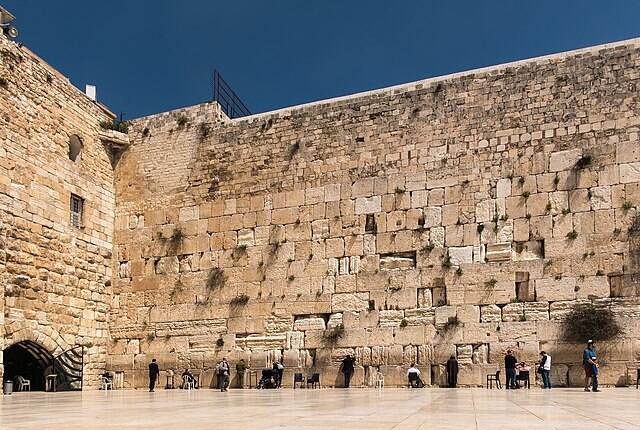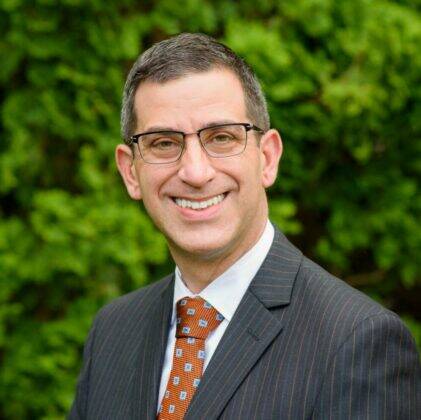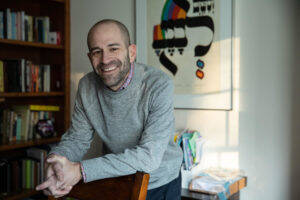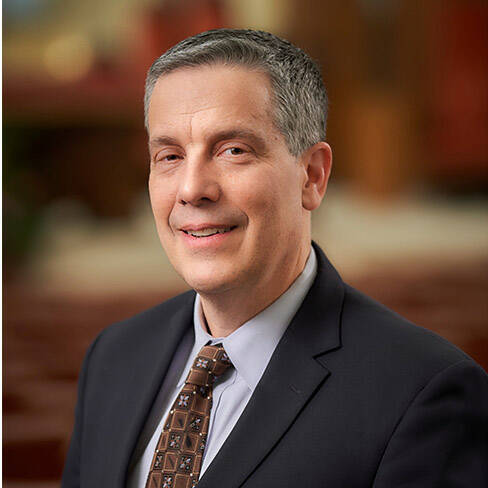 The Western Wall in Jerusalem. (Photo credit: wikicommons/Ralf Roletschek)
The Western Wall in Jerusalem. (Photo credit: wikicommons/Ralf Roletschek)
For many Jews, the High Holidays are the peak of their involvement in synagogue life. They might light Shabbat candles or have a Passover Seder in their homes, but on Rosh Hashanah and Yom Kippur, Reform, Conservative, Orthodox and Reconstructionist synagogues are teeming with congregants.
As another High Holiday season arrives in the shadow of war in the Middle East and rising antisemitism in the United States, rabbis in the Philadelphia area have differing opinions on how much of that modern context to incorporate into the timeless messaging of the Jewish New Year and the Day of Atonement.
Rabbi Charles Briskin at Shir Ami in Newtown said candidly that his congregants, when asked what they want to hear this holiday season, responded with “a message of hope” and the request to not talk politics.
“As I serve a politically diverse congregation, I try to avoid overtly political sermons on the High Holidays,” Briskin said. “More often, I will make passing references or I will allude to what is happening in the world.”
 Rabbi Charles Briskin. (Photo courtesy of Shir Ami)
Rabbi Charles Briskin. (Photo courtesy of Shir Ami)
Rabbi Shraga Sherman of Chabad of the Main Line agreed. He said that he looks to spread a message of unity above all else.
“It’s not a place for political punditry; it’s a place to inspire the Jewish community to have a greater Jewish impact in their personal lives,” he said.
At Congregation Or Ami in Lafayette Hill, Rabbi Glenn Ettman said that he believes in striking a balance.
“I navigate it by helping people ask the right questions and guide [them] using our tradition as a foundation to help us see the world through Jewish lenses, and to be able to live inspired by our tradition so we can live in modern times,” he said.
Rabbi Benjamin David of Reform Congregation Keneseth Israel in Elkins Park said that he believes now is not the time to be timid when it comes to speaking out against injustice.
“Now is not the time for neutrality. Antisemitism runs rampant. Democracy is in peril. Gun violence plagues our nation. Racism, homophobia, transphobia and xenophobia have seemingly been normalized,” David said. “I’ll be speaking about the Jewish propensity to push back against hate, against tyranny and against the undoing of those institutions that have long protected us and other minority communities here in the U.S.”
 Rabbi Benjamin David. (Photo by Colin Lenton)
Rabbi Benjamin David. (Photo by Colin Lenton)
At Beth Sholom Congregation in Elkins Park, Rabbi David Glanzberg-Krainin said that his first of two Rosh Hashanah sermons will directly address the hardships that Israel is facing, as it’s at the forefront of everyone’s mind.
“I think that a lot of us are struggling with the fact that it’s [been] almost two years now since Oct. 7, and that Israel has essentially needed to be at war with Hamas, and there are still hostages that are in Gaza. So, I think my message that I want to talk about is how we win the war without losing our collective soul,” he said.
 Rabbi David Glanzberg-Krainin. (Photo Courtesy of Beth Sholom Congregation)
Rabbi David Glanzberg-Krainin. (Photo Courtesy of Beth Sholom Congregation)
Rabbi Micah Peltz of Temple Beth Sholom in Cherry Hill said he sees a need for a message that acknowledges the conflicting feelings that many of his congregants have right now.
“I think that we’re conflicted as Jewish Americans. … I think we’re conflicted as people committed to Israel, but also to universal values,” he said. “What are the values from our tradition, and particularly the values that we read about in our High Holiday liturgy, that can help us resolve those conflicts and make sense of them and help us move forward?”
Sherman said that, ultimately, his goal is to spur action in those who attend High Holiday services.
“It starts on the individual level, encouraging people to use the inspiration of the High Holidays to connect with their Jewishness in a deeper, more profound, actionable way,” he said.
At the Chabad of Delaware County, Rabbi Tzvi Altein thinks that the feelings many Jews have that are hard to wrestle with and even put into words are appropriate this time of year. After all, he said, they’re not all that different from how we usually feel around the High Holidays.
“That’s kind of what the whole idea of Rosh Hashanah is. You blow a shofar — what is a shofar? It’s a cry. It’s something which goes beyond words. It’s coming from deep inside, and that’s generally Rosh Hashanah — you’re trying to reach deep inside. I think this year, that’s where we have to be. We have to find the strength to face the world and persevere with everything,” he said.